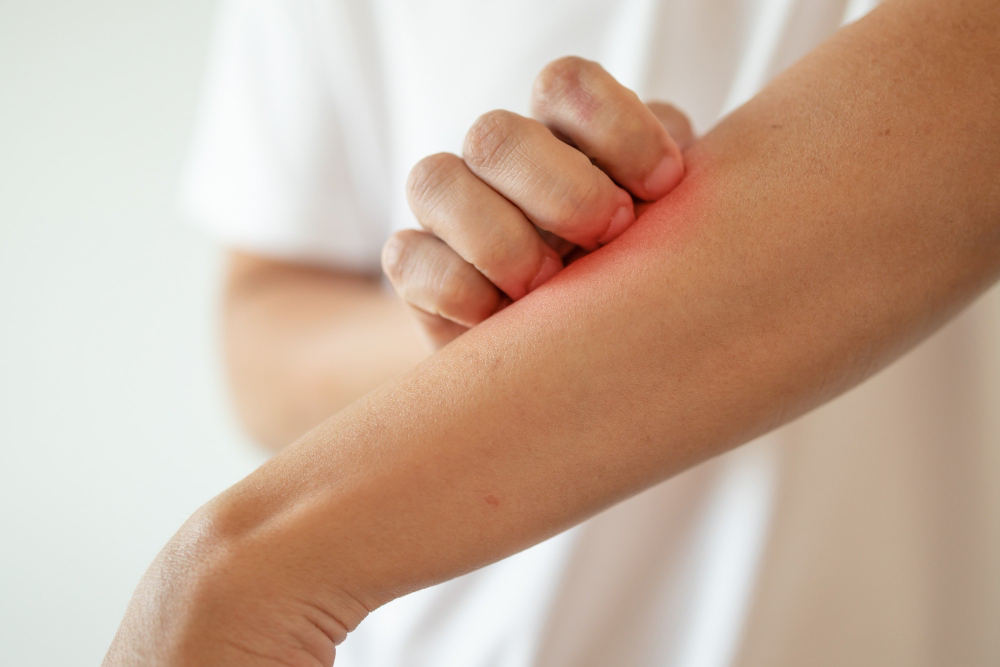Skin & Esthetics
Atopic Eczema: Causes, Symptoms, And Treatment Options
By H.S. (staff writer) , published on October 10, 2021

Medicine Telehealth Health
Living with atopic eczema or dermatitis can be hard because of its increasing prevalence across the world. Although it can settle as you get older, atopic eczema is still challenging to treat. This article looks at the causes of atopic eczema, its symptoms, and its treatment options.
What Is Atopic Eczema?
Atopic eczema, also known as atopic dermatitis, is a complex pruritic skin condition that results in skin dryness, itchiness, and rash. This chronic condition starts in early infancy but can also affect adults [1].
Atopic eczema mainly occurs on the arms, neck, face, behind the knees, and inside the elbows. If you have a family history of food allergy, hay fever, asthma, or any other allergic disease, you are at substantial risk of having atopic eczema.
What Causes It?
No scientific research has fully sorted out the primary cause of atopic eczema. When exposed to irritants, the immune system becomes overactive and disordered, leading to inflammation. The skin becomes itchy and dry as a result of inflammation-causing damage to the skin barrier. Dry skin becomes susceptible to rashes and cracks in atopic eczema [2].
One primary cause of atopic eczema is genetics. You are more prevalent to having atopic eczema if any of your parents have any allergic disorder, asthma, or any form of eczema.
What Are The Symptoms Of Atopic Eczema?
Atopic eczema starts showing its symptoms before a child is five years old. The symptoms of atopic eczema in infants include dry and scaly skin on the face characterized by red patches. These red patches can spread to the neck, arms, and legs.
Other symptoms include:
-
Red rashes on knees and elbow creases
-
Flaky skin
-
Small bumps on the skin
-
Cracked skin that sometimes starts to bleed
-
Intense itching
Treatment Options For Atopic Eczema:
As there's no cure for atopic eczema, its symptoms can be improved by the following treatment options:
1. Emollients (Moisturizers): Atopic eczema causes extreme dryness of the skin. Moisturizers are the first treatment option for relieving itchiness and dryness of the skin. The best time to apply a moisturizer is to apply it immediately after bathing. Lotions, creams, and ointments are three types of moisturizers that can be very helpful in hydrating the skin.
2. Topical Steroids: Topical steroids come as ointments and creams to prevent inflammation during flare-ups. Low potency topical steroids are helpful as a short-term treatment option. You should apply topical steroids to your skin twice a day.
3. Antihistamines: Atopic eczema can also be treated by the oral supplementation of antihistamines. However, there’s no validation on the efficacy of antihistamines. But the itch-scratch cycle can highly be managed by antihistamines like Benadryl (diphenhydramine) [3].
4. Oral Medications: One of the most studied treatment options for atopic eczema includes oral medications like cyclosporine or interferon, oral corticosteroids, and antibiotics in case of bacterial infection.
5. Phototherapy: Phototherapy has been proved to be effective in 70% of patients undergoing it. During phototherapy, patients are treated with ultraviolet B light (NB-UVB) to overcome the damaging effects of ultraviolet A radiation coming from the sun [4].
References:
-
Kim BS. Atopic Dermatitis: Practice Essentials, Background, Pathophysiology n.d. https://emedicine.medscape.com/article/1049085-overview
-
De Benedetto A, Agnihothri R, McGirt LY, Bankova LG, Beck LA. Atopic Dermatitis: A Disease Caused by Innate Immune Defects? J Invest Dermatol 2009;129:14–30. https://doi.org/https://doi.org/10.1038/jid.2008.259.
-
Hanifin J, Chan SC. Diagnosis and treatment of atopic dermatitis. Dermatologic Therapy. 1996 Dec 1;1:9-18.
-
Phototherapy for Eczema | Phototherapy for Atopic Dermatitis n.d. https://nationaleczema.org/eczema/treatment/phototherapy/
Find articles related to: Medicine Telehealth Health
More articles about Skin & Esthetics
Back to the Health Tips Index




